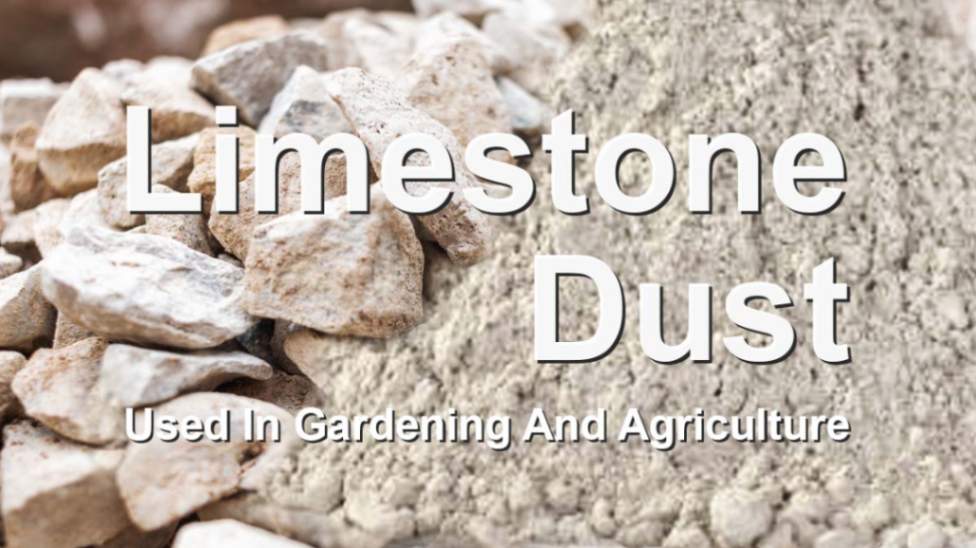Limestone dust is widely used in gardening and agriculture for its unique mineral composition and the benefits it provides to soil and plant health. It can help balance soil pH levels, enhance nutrient availability, improve soil structure and act as a natural pest deterrent. It contains essential nutrients like calcium and magnesium which are often deficient in soils making it beneficial for plant growth. Here’s a detailed overview of limestone dust, including its mineral compositions, properties, typical analysis and its advantages for gardening:
What is Limestone Dust?
Limestone dust is a fine powder obtained from crushed limestone rock. Limestone is a sedimentary rock that is mainly composed of calcium carbonate (CaCO3). This type of dust is also known as agricultural lime or aglime.
Mineral Compositions
Limestone rock dust consists primarily of calcium carbonate, but it can also contain various impurities and trace minerals depending on the source. The key mineral in limestone dust is:
- Calcium Carbonate (CaCO3): This mineral is the primary component of limestone and is rich in calcium, which is essential for plant growth. Calcium also helps raise soil pH.
Properties
Limestone dust is typically ground into fine particles, ranging from a few microns to a few millimeters in size. It often appears as a white or off-white powder and has a fine, powdery texture.
Typical Analysis
The mineral composition of limestone dust is relatively straightforward, with the primary component being calcium carbonate (CaCO3). A typical analysis might include:
Limestone Dust Benefits For Gardening
Limestone dust offers several advantages for gardening and agriculture:
- pH Adjustment: One of the primary uses of limestone dust is to raise soil pH, making it less acidic. This is especially beneficial in acidic soils, as many plants prefer a slightly alkaline pH range for optimal growth. Limestone dust helps neutralize soil acidity, creating a more suitable environment for a wide range of crops.
- Calcium Enrichment: Limestone dust is an excellent source of calcium, an essential nutrient for plant development. Adequate calcium promotes strong cell walls, root growth, and overall plant health.
- Nutrient Availability: By raising pH and improving soil structure, limestone dust enhances the availability of other essential nutrients in the soil. This makes it easier for plants to access nutrients like phosphorus and magnesium.
- Reducing Toxicity: In some cases, soils may contain high levels of toxic elements like aluminum, which become less soluble and less toxic in less acidic conditions. Limestone dust’s pH-raising effect can help mitigate the harmful effects of such elements.
- Improved Soil Structure: Limestone dust can enhance soil structure by reducing compaction and improving water retention, allowing for better root growth and overall plant health.
- Environmental Benefits: The use of limestone dust is considered eco-friendly, as it is a natural resource that can help reduce the need for synthetic pH-adjusting chemicals.
Conclusion
Limestone dust is a valuable soil amendment primarily used for raising soil pH and providing calcium to plants. It helps create a more favorable environment for plant growth by reducing soil acidity, improving nutrient availability, and enhancing soil structure. Gardeners and farmers often use limestone dust as part of their soil management strategies to support healthier and more productive crops.
FAQs
Is limestone dust safe for organic gardening?
Yes, limestone dust is considered safe for organic gardening as it is a natural product and does not contain synthetic chemicals.
How often should I apply limestone dust to my garden?
The frequency of application depends on your soil’s pH and the crops you are growing. It’s best to conduct a soil test to determine the appropriate schedule.
Can limestone dust be harmful to plants if overused?
Excessive use of limestone dust can raise soil pH too high, which may be detrimental to some plants. It’s important to follow recommended application rates.
Where can I purchase limestone dust for my gardening or farming needs?
You can usually find limestone dust at garden centers, agricultural supply stores or online suppliers.
Are there any precautions I should take when handling limestone dust?
When handling limestone dust, it is advisable to wear protective gear, such as gloves and a dust mask to avoid inhaling the fine particles.
Also Read
Rock Dust in Your Garden: The Key to Lush and Healthy Plants
Industrial Dust: Understanding its Impact and Management

